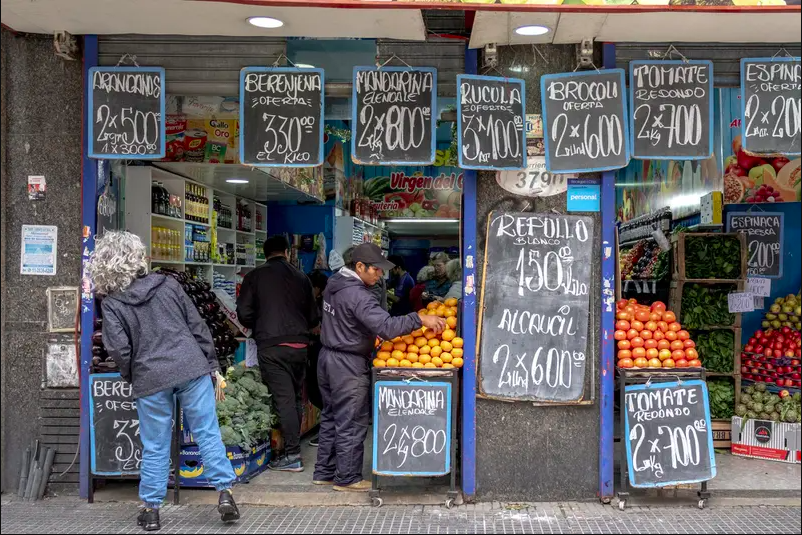
Published 04/25/2024 17:30 | Edited 04/25/2024 20:12
In Argentina, the economic scenario of 2024 is marked by a consumption crisis that indiscriminately affects all sectors of the domestic market, from supermarkets to household appliances, from automobiles to restaurants. This crisis, which differs in its magnitude, does not spare even pharmacies, reflecting a situation of deep recession that challenges companies and consumers across the country.
Although there are positive signs, such as the slowdown in inflation in recent months, the Argentine economy continues to face significant challenges, especially in sectors dependent on the evolution of wages and employment. This process is seen as unprecedented, forcing all companies to redefine their business strategies.
The recession is particularly severe in the food and medicine sectors, with a 10% drop in sales of basic food products. Pharmacies also suffered from a double-digit drop in the first quarter of the year, even impacting long-term treatments in underserved areas.
Read also: Argentina’s largest union center announces general strike against Milei
O Red Portal sought the testimony of two Argentines who are living in this reality of recession and observing the progress of the Milei Government in the midst of turbulence such as the gigantic University March, which took place this Tuesday (23), across the country. A university professor and a trade unionist from the symbolic leather industry.
Let’s see the industry

Marcela Oliver, psychoanalyst and writer, as well as professor at the University of Buenos Aires (UBA), shared her perspectives on the current political and economic crisis in Argentina, which she describes as a disaster.
For her, the current situation evokes a feeling of already seencomparing the neoliberal policies proposed by Milei with those implemented during Carlos Menem’s government in the 1990s. She emphasized that these policies have already proven to be flawed in the past, resulting in privatizations “at a bargain price” and the deterioration of public services.
Read also: Without funding, Argentine universities are on the verge of collapse
“But now, things are even angrier, because not even under Macri’s government, which was a right-wing government, did they attack public education and health, and science too, as they are attacking at the moment.” For her, the right represented by Milei goes far beyond neoliberal economic technocracy.
“This is not just a question of macroeconomics and fiscal adjustment, but a clear attempt to dismantle institutions that are considered to be of the ‘deaf’, that is, those who care about science, education and public health,” stated Marcela, citing the nickname given by Milei to those he considers to be on the left. She explains that the institutions that are being closed are self-sustainable.

Ernesto Quiqui Trigo, general secretary of the Argentine Leather Manufacturers Union (SAMC), denounced the measures adopted by the Argentine government, describing them as disastrous for the country’s industrial sector. With the liberalization of imports, products of all types enter the country in unfair competition with local industry.
Read also: Record inflation and war on politics mark Milei’s 100 days in Argentina
According to him, Argentines pay up to 400% more for services such as electricity and gas, in addition to increased taxes. “A catastrophic situation! We believe that in a few months this could explode, because people will not be able to feed themselves.” He says that Argentine food prices are already more expensive than in Europe, where salaries are much higher and Argentina is one of the largest food producers in the world. Rental prices have also exploded, affecting the arrival of tourists, according to him.
Ernesto expressed his concern about these negative consequences of the economic policies implemented by the Milei government. “The measures adopted by the government, through the Ómnibus Law, are disastrous. It is an industricide for the industry”, declared the trade unionist, highlighting the devastating impact of neoliberal policies. He warned that the liberalization of the economy had resulted in the market being flooded with foreign products, leading to a precipitous drop in sales and industrial production.
Economic fallacies
Marcela expressed concern about growing precariousness, which is not new in the current government, but highlighted that tools that could protect the population from these abuses are now being attacked. “These guys traffic in numbers without thinking that there are people behind them”, recalls the psychoanalyst.
She also addressed economic issues, highlighting the precariousness of work and the increase in poverty and informality, problems that did not only arise under the current government. She criticized the government’s lack of consideration for the social impacts of its economic policies and the idea that inflation will automatically decrease as the dollar falls.
Read also: Pressure from businesspeople on Milei is a sign of social upheaval in Argentina
Marcela pointed out the disconnect between the fall of the dollar and the continuous increase in prices. “The dollar has fallen and prices continue to rise. So, this peregrine idea that the famous V effect will arrive (after the deep recession, the economy would show a rapid growth trajectory, returning to the pre-crisis pattern), it seems that it is not happening”, she accuses.
She questioned the effectiveness of the government’s economic measures. In the health area, the drop in sales in pharmacies reveals that people are stopping taking their medications. Meanwhile, she denounces, the “liberal” Milei intervenes in the prices of private health plans, where he believes his voters are.
Ernesto explained that the leather industry faced a significant reduction in sales, while the costs of essential services such as electricity, gas and transport increased drastically, further exacerbating the economic crisis. “In three months of Milei’s government, this generated a drop in sales and production of between 40% and 50%,” he said.
Read also: Full of expectations, Argentina begins March without announcements, but heading towards recession
However, Ernesto highlighted that his category was the union that had the highest percentage increase last year. Workers in leather factories had a 277% increase, with inflation of approximately 220%. “It was a historic achievement that our union achieved, while public servants, who negotiate with the government, received a 20% increase.”
The union leader also criticized the government’s devaluation of the currency, which resulted in high inflation rates. He emphasized that Argentine workers are suffering from inadequate minimum wages ($200) in the face of rising prices for basic products, making life in Argentina extremely expensive.
For Ernesto, the government is cynical when it goes on TV to say that, for the first time in many years, there was a fiscal surplus. “There is a fiscal surplus, because the government does not pay what it owes. Universities were not paid for, cancer treatments were not paid for Argentine citizens who are being treated for cancer, for example. So, when you don’t pay, you lose money in your pocket”, says the union leader.
Mobilization in the streets
Faced with this worrying scenario, Ernesto announced plans for a large union mobilization on Labor Day, aiming to protest government policies and demand better conditions for Argentine workers.
“The union movement has planned to carry out a large mobilization on May Day”, he revealed. “We are talking about mobilizations like the strike on January 24th,” he said, citing gigantic strikes with almost two million protesters.
The psychoanalyst also commented on the recent demonstrations, highlighting the importance of public education as a crucial means of social mobility. She emphasized that the marches are not just about the lack of resources for universities, which she knows as a teacher and student, but also about defending the social mobility provided by public education.
Marcela also addressed the debate about supposed indoctrination in public educational institutions. She cited writer Martin Kohan, who says that talking about indoctrination implies an authoritarian teacher and an empty-headed student. She highlighted that professors now face the possibility of being reported for indoctrination, a measure she considers authoritarian and detrimental to academic freedom. “If this isn’t a witch hunt… well, I guess it is!”, she concluded
“It is a government that came with a speech about taking away the privileges and deals of the political caste and we clearly realize that the caste is us, the workers losing elementary rights”. As Ernesto says, just look at who benefits from the policies: the financial sector, the private health sector, the speculative sectors and foreign capital.
Source: vermelho.org.br

